Analyzing Challenges: Hospitality, Leisure & Travel During COVID
VerifiedAdded on 2023/06/18
|7
|2097
|108
Essay
AI Summary
This essay discusses the significant challenges that the COVID-19 pandemic has imposed on the hospitality, leisure, and travel industries. It explores both the positive and negative impacts, such as the increased emphasis on hygiene and technology adoption versus the operational uncertainties and financial losses. The analysis includes examples of companies like Nando's and Hilton adapting through innovative services. The essay concludes that while the pandemic has severely affected these sectors, it has also driven innovation and a focus on secure, hygienic services, which will likely shape the future of hospitality. Desklib offers similar solved assignments and resources for students.
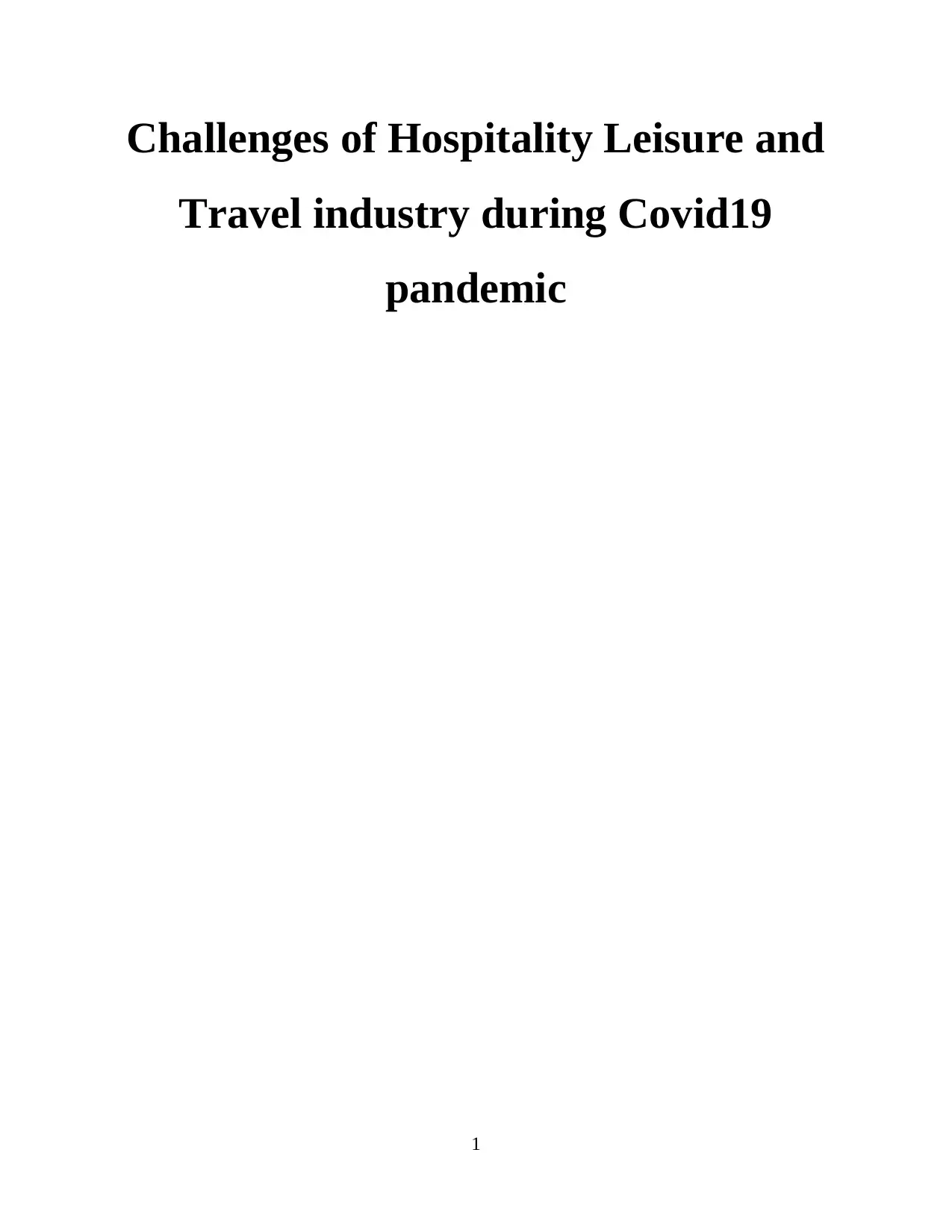
Challenges of Hospitality Leisure and
Travel industry during Covid19
pandemic
1
Travel industry during Covid19
pandemic
1
Paraphrase This Document
Need a fresh take? Get an instant paraphrase of this document with our AI Paraphraser
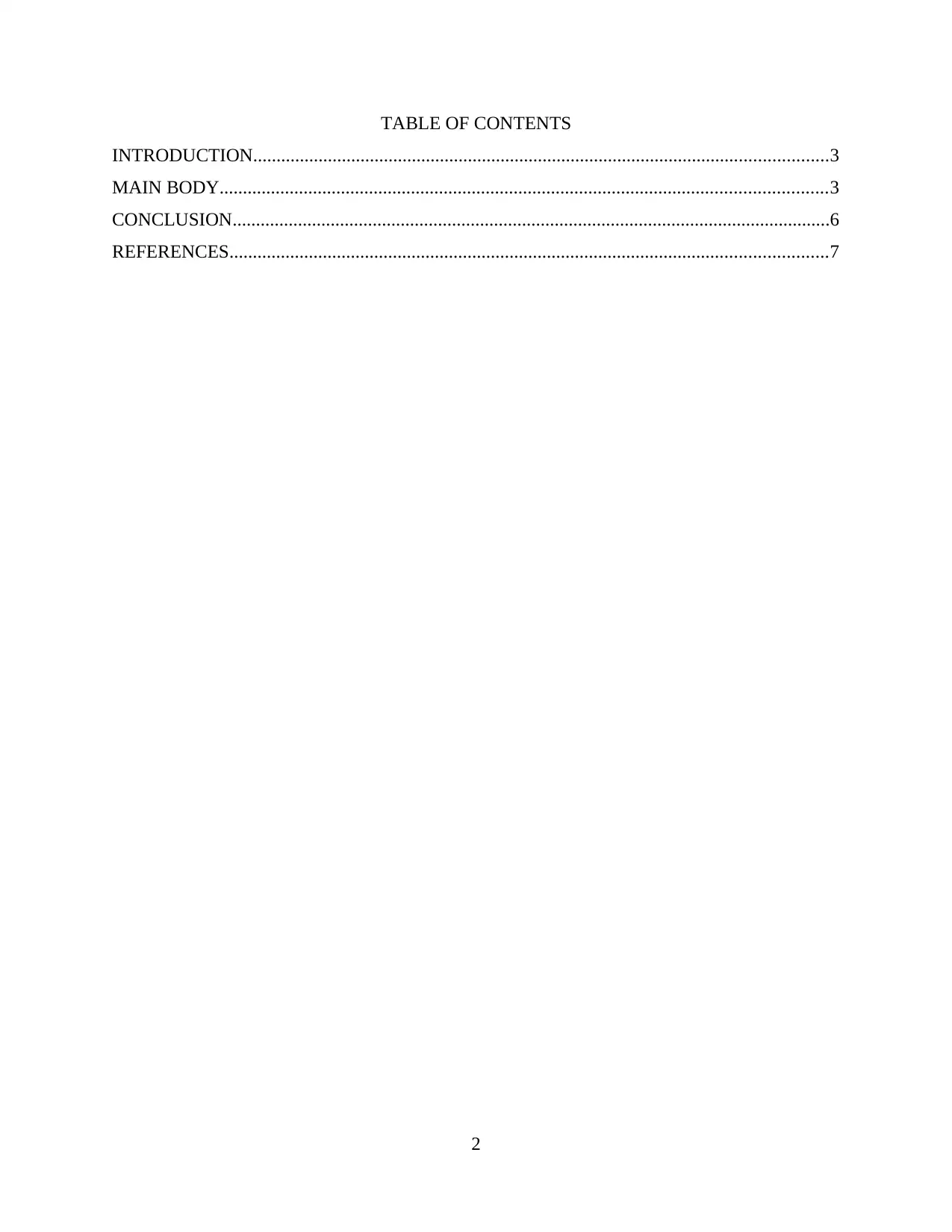
TABLE OF CONTENTS
INTRODUCTION...........................................................................................................................3
MAIN BODY..................................................................................................................................3
CONCLUSION................................................................................................................................6
REFERENCES................................................................................................................................7
2
INTRODUCTION...........................................................................................................................3
MAIN BODY..................................................................................................................................3
CONCLUSION................................................................................................................................6
REFERENCES................................................................................................................................7
2
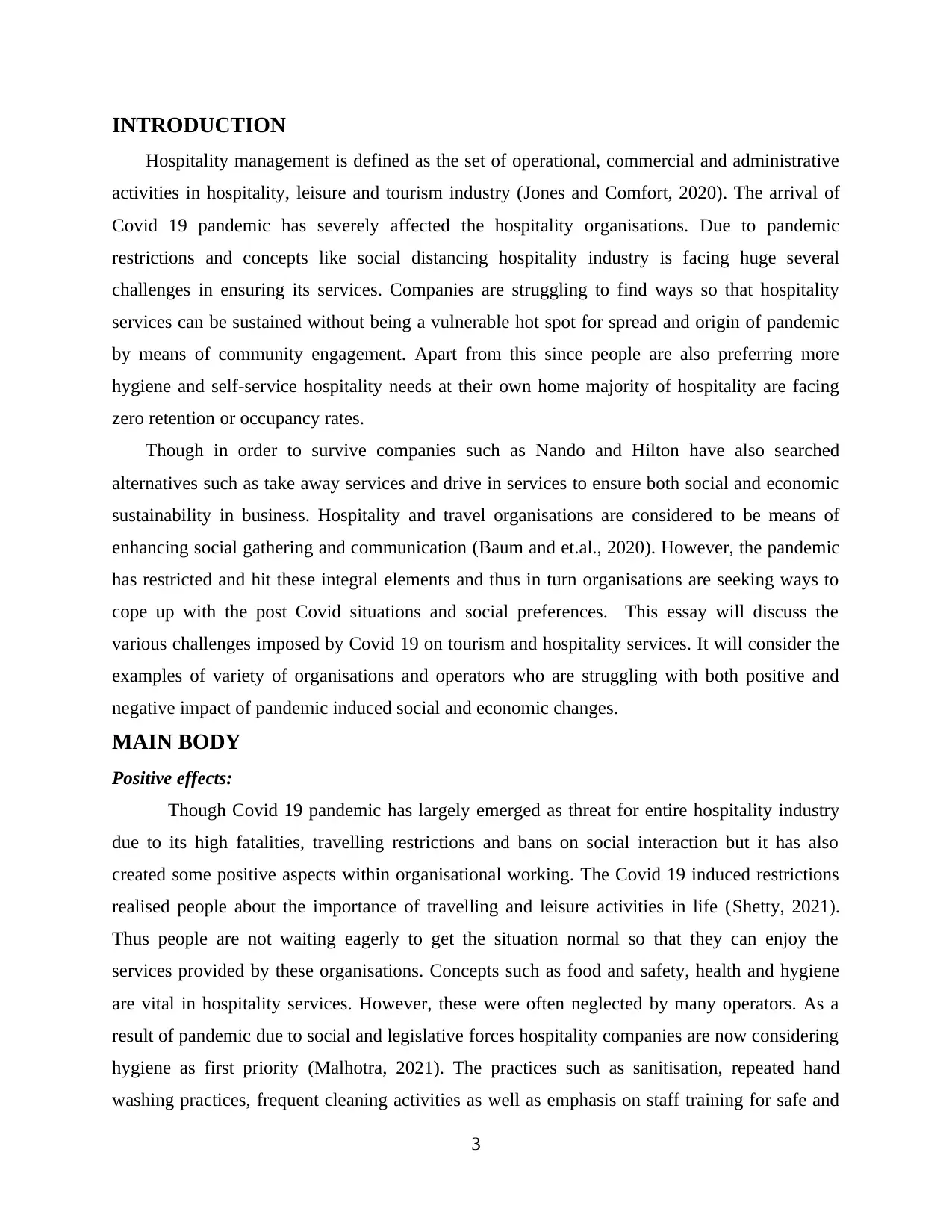
INTRODUCTION
Hospitality management is defined as the set of operational, commercial and administrative
activities in hospitality, leisure and tourism industry (Jones and Comfort, 2020). The arrival of
Covid 19 pandemic has severely affected the hospitality organisations. Due to pandemic
restrictions and concepts like social distancing hospitality industry is facing huge several
challenges in ensuring its services. Companies are struggling to find ways so that hospitality
services can be sustained without being a vulnerable hot spot for spread and origin of pandemic
by means of community engagement. Apart from this since people are also preferring more
hygiene and self-service hospitality needs at their own home majority of hospitality are facing
zero retention or occupancy rates.
Though in order to survive companies such as Nando and Hilton have also searched
alternatives such as take away services and drive in services to ensure both social and economic
sustainability in business. Hospitality and travel organisations are considered to be means of
enhancing social gathering and communication (Baum and et.al., 2020). However, the pandemic
has restricted and hit these integral elements and thus in turn organisations are seeking ways to
cope up with the post Covid situations and social preferences. This essay will discuss the
various challenges imposed by Covid 19 on tourism and hospitality services. It will consider the
examples of variety of organisations and operators who are struggling with both positive and
negative impact of pandemic induced social and economic changes.
MAIN BODY
Positive effects:
Though Covid 19 pandemic has largely emerged as threat for entire hospitality industry
due to its high fatalities, travelling restrictions and bans on social interaction but it has also
created some positive aspects within organisational working. The Covid 19 induced restrictions
realised people about the importance of travelling and leisure activities in life (Shetty, 2021).
Thus people are not waiting eagerly to get the situation normal so that they can enjoy the
services provided by these organisations. Concepts such as food and safety, health and hygiene
are vital in hospitality services. However, these were often neglected by many operators. As a
result of pandemic due to social and legislative forces hospitality companies are now considering
hygiene as first priority (Malhotra, 2021). The practices such as sanitisation, repeated hand
washing practices, frequent cleaning activities as well as emphasis on staff training for safe and
3
Hospitality management is defined as the set of operational, commercial and administrative
activities in hospitality, leisure and tourism industry (Jones and Comfort, 2020). The arrival of
Covid 19 pandemic has severely affected the hospitality organisations. Due to pandemic
restrictions and concepts like social distancing hospitality industry is facing huge several
challenges in ensuring its services. Companies are struggling to find ways so that hospitality
services can be sustained without being a vulnerable hot spot for spread and origin of pandemic
by means of community engagement. Apart from this since people are also preferring more
hygiene and self-service hospitality needs at their own home majority of hospitality are facing
zero retention or occupancy rates.
Though in order to survive companies such as Nando and Hilton have also searched
alternatives such as take away services and drive in services to ensure both social and economic
sustainability in business. Hospitality and travel organisations are considered to be means of
enhancing social gathering and communication (Baum and et.al., 2020). However, the pandemic
has restricted and hit these integral elements and thus in turn organisations are seeking ways to
cope up with the post Covid situations and social preferences. This essay will discuss the
various challenges imposed by Covid 19 on tourism and hospitality services. It will consider the
examples of variety of organisations and operators who are struggling with both positive and
negative impact of pandemic induced social and economic changes.
MAIN BODY
Positive effects:
Though Covid 19 pandemic has largely emerged as threat for entire hospitality industry
due to its high fatalities, travelling restrictions and bans on social interaction but it has also
created some positive aspects within organisational working. The Covid 19 induced restrictions
realised people about the importance of travelling and leisure activities in life (Shetty, 2021).
Thus people are not waiting eagerly to get the situation normal so that they can enjoy the
services provided by these organisations. Concepts such as food and safety, health and hygiene
are vital in hospitality services. However, these were often neglected by many operators. As a
result of pandemic due to social and legislative forces hospitality companies are now considering
hygiene as first priority (Malhotra, 2021). The practices such as sanitisation, repeated hand
washing practices, frequent cleaning activities as well as emphasis on staff training for safe and
3
⊘ This is a preview!⊘
Do you want full access?
Subscribe today to unlock all pages.

Trusted by 1+ million students worldwide
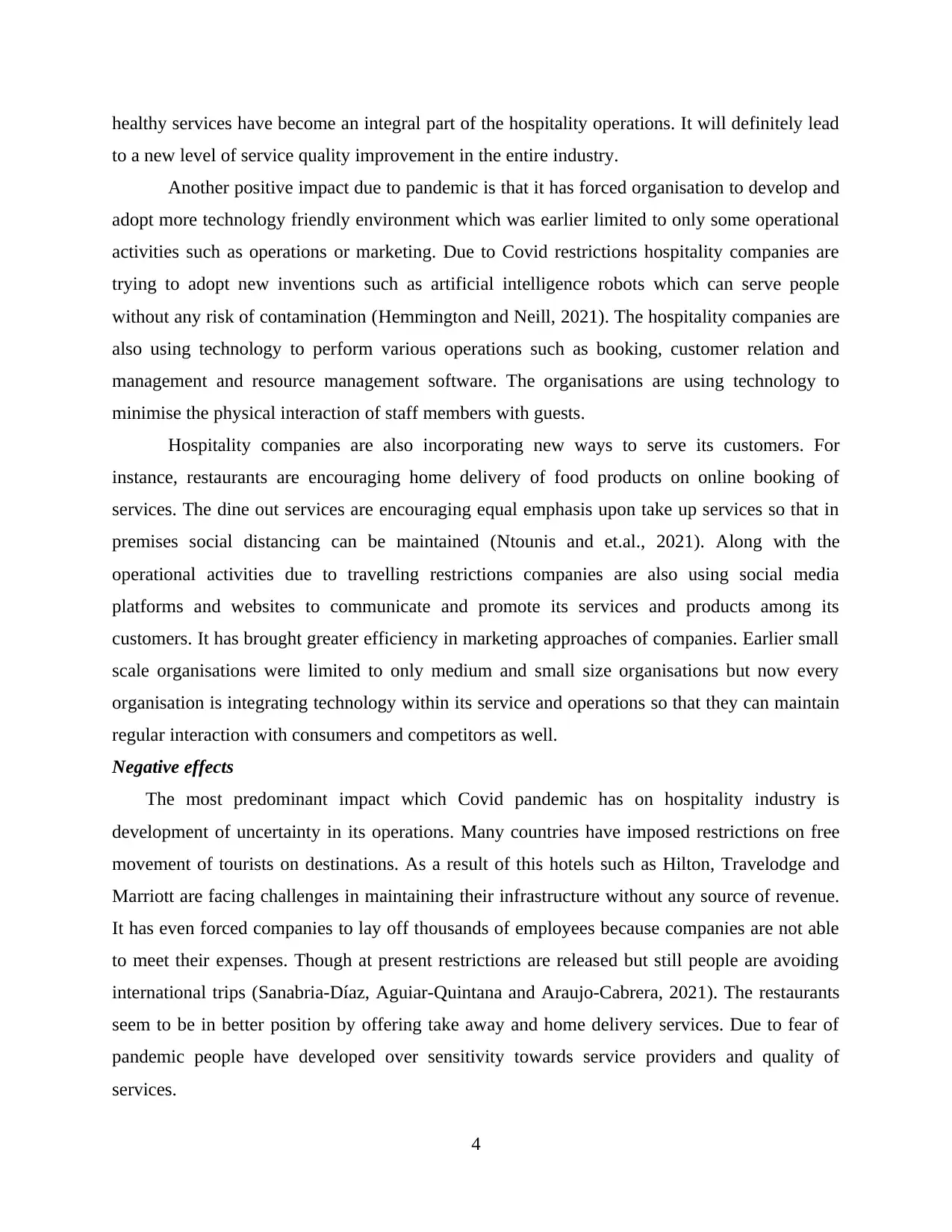
healthy services have become an integral part of the hospitality operations. It will definitely lead
to a new level of service quality improvement in the entire industry.
Another positive impact due to pandemic is that it has forced organisation to develop and
adopt more technology friendly environment which was earlier limited to only some operational
activities such as operations or marketing. Due to Covid restrictions hospitality companies are
trying to adopt new inventions such as artificial intelligence robots which can serve people
without any risk of contamination (Hemmington and Neill, 2021). The hospitality companies are
also using technology to perform various operations such as booking, customer relation and
management and resource management software. The organisations are using technology to
minimise the physical interaction of staff members with guests.
Hospitality companies are also incorporating new ways to serve its customers. For
instance, restaurants are encouraging home delivery of food products on online booking of
services. The dine out services are encouraging equal emphasis upon take up services so that in
premises social distancing can be maintained (Ntounis and et.al., 2021). Along with the
operational activities due to travelling restrictions companies are also using social media
platforms and websites to communicate and promote its services and products among its
customers. It has brought greater efficiency in marketing approaches of companies. Earlier small
scale organisations were limited to only medium and small size organisations but now every
organisation is integrating technology within its service and operations so that they can maintain
regular interaction with consumers and competitors as well.
Negative effects
The most predominant impact which Covid pandemic has on hospitality industry is
development of uncertainty in its operations. Many countries have imposed restrictions on free
movement of tourists on destinations. As a result of this hotels such as Hilton, Travelodge and
Marriott are facing challenges in maintaining their infrastructure without any source of revenue.
It has even forced companies to lay off thousands of employees because companies are not able
to meet their expenses. Though at present restrictions are released but still people are avoiding
international trips (Sanabria-Díaz, Aguiar-Quintana and Araujo-Cabrera, 2021). The restaurants
seem to be in better position by offering take away and home delivery services. Due to fear of
pandemic people have developed over sensitivity towards service providers and quality of
services.
4
to a new level of service quality improvement in the entire industry.
Another positive impact due to pandemic is that it has forced organisation to develop and
adopt more technology friendly environment which was earlier limited to only some operational
activities such as operations or marketing. Due to Covid restrictions hospitality companies are
trying to adopt new inventions such as artificial intelligence robots which can serve people
without any risk of contamination (Hemmington and Neill, 2021). The hospitality companies are
also using technology to perform various operations such as booking, customer relation and
management and resource management software. The organisations are using technology to
minimise the physical interaction of staff members with guests.
Hospitality companies are also incorporating new ways to serve its customers. For
instance, restaurants are encouraging home delivery of food products on online booking of
services. The dine out services are encouraging equal emphasis upon take up services so that in
premises social distancing can be maintained (Ntounis and et.al., 2021). Along with the
operational activities due to travelling restrictions companies are also using social media
platforms and websites to communicate and promote its services and products among its
customers. It has brought greater efficiency in marketing approaches of companies. Earlier small
scale organisations were limited to only medium and small size organisations but now every
organisation is integrating technology within its service and operations so that they can maintain
regular interaction with consumers and competitors as well.
Negative effects
The most predominant impact which Covid pandemic has on hospitality industry is
development of uncertainty in its operations. Many countries have imposed restrictions on free
movement of tourists on destinations. As a result of this hotels such as Hilton, Travelodge and
Marriott are facing challenges in maintaining their infrastructure without any source of revenue.
It has even forced companies to lay off thousands of employees because companies are not able
to meet their expenses. Though at present restrictions are released but still people are avoiding
international trips (Sanabria-Díaz, Aguiar-Quintana and Araujo-Cabrera, 2021). The restaurants
seem to be in better position by offering take away and home delivery services. Due to fear of
pandemic people have developed over sensitivity towards service providers and quality of
services.
4
Paraphrase This Document
Need a fresh take? Get an instant paraphrase of this document with our AI Paraphraser
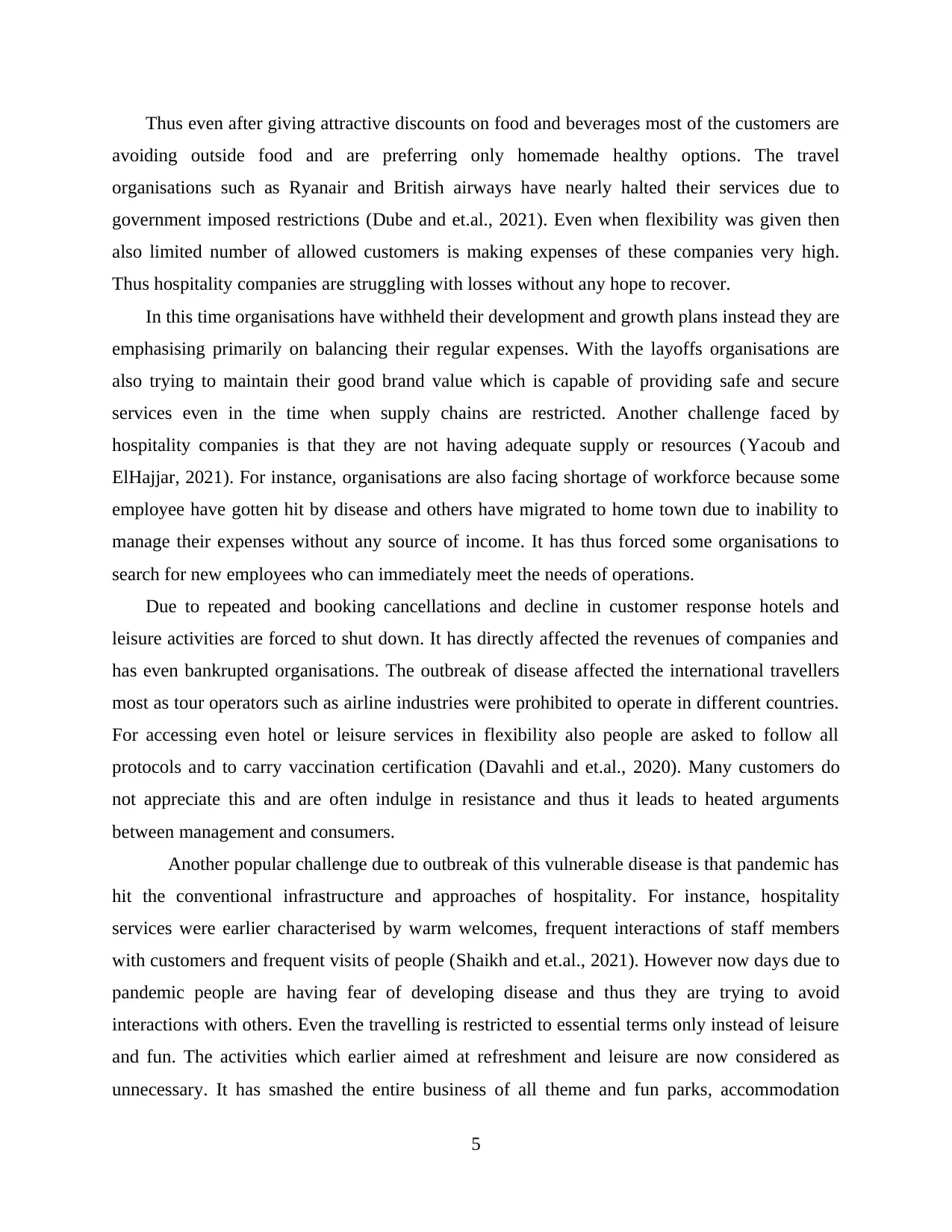
Thus even after giving attractive discounts on food and beverages most of the customers are
avoiding outside food and are preferring only homemade healthy options. The travel
organisations such as Ryanair and British airways have nearly halted their services due to
government imposed restrictions (Dube and et.al., 2021). Even when flexibility was given then
also limited number of allowed customers is making expenses of these companies very high.
Thus hospitality companies are struggling with losses without any hope to recover.
In this time organisations have withheld their development and growth plans instead they are
emphasising primarily on balancing their regular expenses. With the layoffs organisations are
also trying to maintain their good brand value which is capable of providing safe and secure
services even in the time when supply chains are restricted. Another challenge faced by
hospitality companies is that they are not having adequate supply or resources (Yacoub and
ElHajjar, 2021). For instance, organisations are also facing shortage of workforce because some
employee have gotten hit by disease and others have migrated to home town due to inability to
manage their expenses without any source of income. It has thus forced some organisations to
search for new employees who can immediately meet the needs of operations.
Due to repeated and booking cancellations and decline in customer response hotels and
leisure activities are forced to shut down. It has directly affected the revenues of companies and
has even bankrupted organisations. The outbreak of disease affected the international travellers
most as tour operators such as airline industries were prohibited to operate in different countries.
For accessing even hotel or leisure services in flexibility also people are asked to follow all
protocols and to carry vaccination certification (Davahli and et.al., 2020). Many customers do
not appreciate this and are often indulge in resistance and thus it leads to heated arguments
between management and consumers.
Another popular challenge due to outbreak of this vulnerable disease is that pandemic has
hit the conventional infrastructure and approaches of hospitality. For instance, hospitality
services were earlier characterised by warm welcomes, frequent interactions of staff members
with customers and frequent visits of people (Shaikh and et.al., 2021). However now days due to
pandemic people are having fear of developing disease and thus they are trying to avoid
interactions with others. Even the travelling is restricted to essential terms only instead of leisure
and fun. The activities which earlier aimed at refreshment and leisure are now considered as
unnecessary. It has smashed the entire business of all theme and fun parks, accommodation
5
avoiding outside food and are preferring only homemade healthy options. The travel
organisations such as Ryanair and British airways have nearly halted their services due to
government imposed restrictions (Dube and et.al., 2021). Even when flexibility was given then
also limited number of allowed customers is making expenses of these companies very high.
Thus hospitality companies are struggling with losses without any hope to recover.
In this time organisations have withheld their development and growth plans instead they are
emphasising primarily on balancing their regular expenses. With the layoffs organisations are
also trying to maintain their good brand value which is capable of providing safe and secure
services even in the time when supply chains are restricted. Another challenge faced by
hospitality companies is that they are not having adequate supply or resources (Yacoub and
ElHajjar, 2021). For instance, organisations are also facing shortage of workforce because some
employee have gotten hit by disease and others have migrated to home town due to inability to
manage their expenses without any source of income. It has thus forced some organisations to
search for new employees who can immediately meet the needs of operations.
Due to repeated and booking cancellations and decline in customer response hotels and
leisure activities are forced to shut down. It has directly affected the revenues of companies and
has even bankrupted organisations. The outbreak of disease affected the international travellers
most as tour operators such as airline industries were prohibited to operate in different countries.
For accessing even hotel or leisure services in flexibility also people are asked to follow all
protocols and to carry vaccination certification (Davahli and et.al., 2020). Many customers do
not appreciate this and are often indulge in resistance and thus it leads to heated arguments
between management and consumers.
Another popular challenge due to outbreak of this vulnerable disease is that pandemic has
hit the conventional infrastructure and approaches of hospitality. For instance, hospitality
services were earlier characterised by warm welcomes, frequent interactions of staff members
with customers and frequent visits of people (Shaikh and et.al., 2021). However now days due to
pandemic people are having fear of developing disease and thus they are trying to avoid
interactions with others. Even the travelling is restricted to essential terms only instead of leisure
and fun. The activities which earlier aimed at refreshment and leisure are now considered as
unnecessary. It has smashed the entire business of all theme and fun parks, accommodation
5
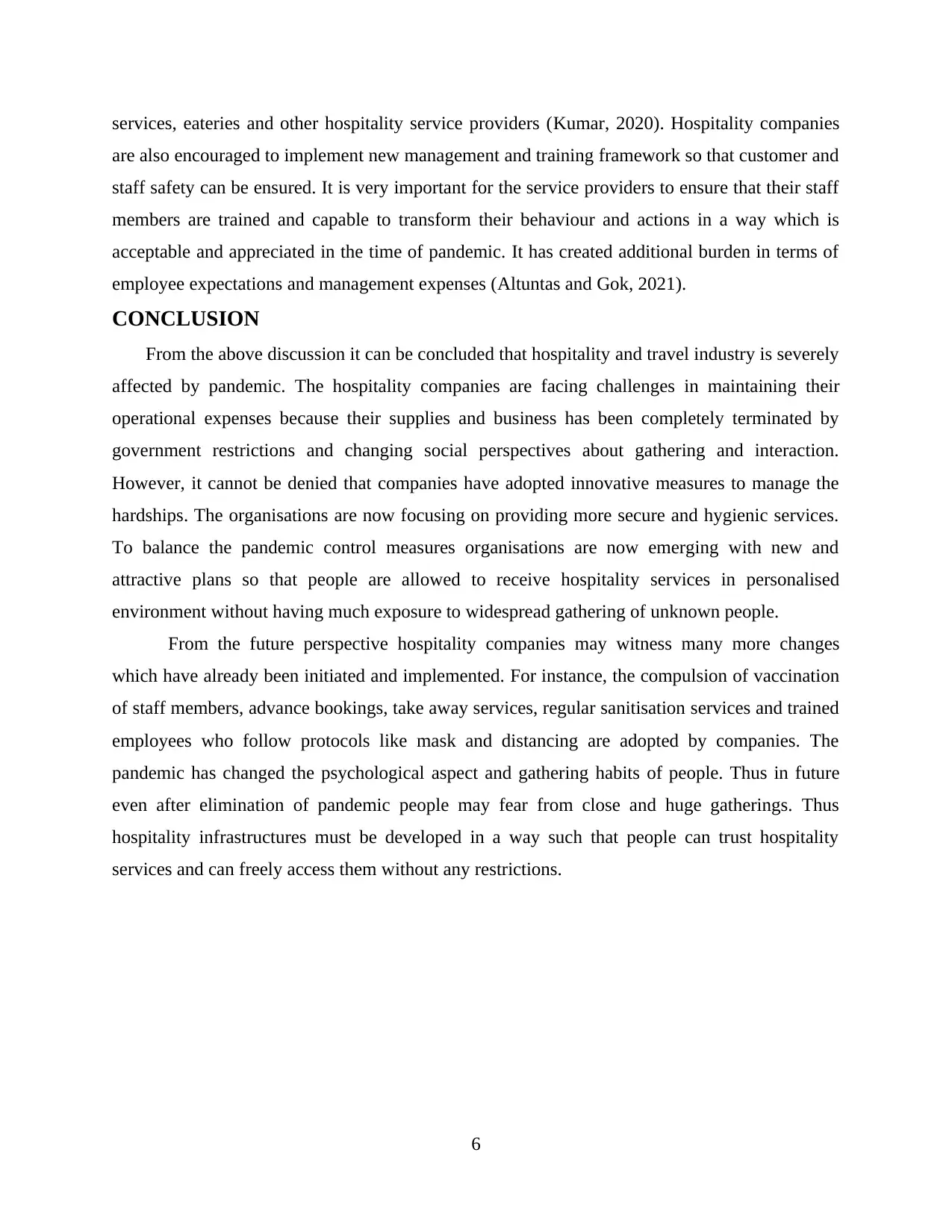
services, eateries and other hospitality service providers (Kumar, 2020). Hospitality companies
are also encouraged to implement new management and training framework so that customer and
staff safety can be ensured. It is very important for the service providers to ensure that their staff
members are trained and capable to transform their behaviour and actions in a way which is
acceptable and appreciated in the time of pandemic. It has created additional burden in terms of
employee expectations and management expenses (Altuntas and Gok, 2021).
CONCLUSION
From the above discussion it can be concluded that hospitality and travel industry is severely
affected by pandemic. The hospitality companies are facing challenges in maintaining their
operational expenses because their supplies and business has been completely terminated by
government restrictions and changing social perspectives about gathering and interaction.
However, it cannot be denied that companies have adopted innovative measures to manage the
hardships. The organisations are now focusing on providing more secure and hygienic services.
To balance the pandemic control measures organisations are now emerging with new and
attractive plans so that people are allowed to receive hospitality services in personalised
environment without having much exposure to widespread gathering of unknown people.
From the future perspective hospitality companies may witness many more changes
which have already been initiated and implemented. For instance, the compulsion of vaccination
of staff members, advance bookings, take away services, regular sanitisation services and trained
employees who follow protocols like mask and distancing are adopted by companies. The
pandemic has changed the psychological aspect and gathering habits of people. Thus in future
even after elimination of pandemic people may fear from close and huge gatherings. Thus
hospitality infrastructures must be developed in a way such that people can trust hospitality
services and can freely access them without any restrictions.
6
are also encouraged to implement new management and training framework so that customer and
staff safety can be ensured. It is very important for the service providers to ensure that their staff
members are trained and capable to transform their behaviour and actions in a way which is
acceptable and appreciated in the time of pandemic. It has created additional burden in terms of
employee expectations and management expenses (Altuntas and Gok, 2021).
CONCLUSION
From the above discussion it can be concluded that hospitality and travel industry is severely
affected by pandemic. The hospitality companies are facing challenges in maintaining their
operational expenses because their supplies and business has been completely terminated by
government restrictions and changing social perspectives about gathering and interaction.
However, it cannot be denied that companies have adopted innovative measures to manage the
hardships. The organisations are now focusing on providing more secure and hygienic services.
To balance the pandemic control measures organisations are now emerging with new and
attractive plans so that people are allowed to receive hospitality services in personalised
environment without having much exposure to widespread gathering of unknown people.
From the future perspective hospitality companies may witness many more changes
which have already been initiated and implemented. For instance, the compulsion of vaccination
of staff members, advance bookings, take away services, regular sanitisation services and trained
employees who follow protocols like mask and distancing are adopted by companies. The
pandemic has changed the psychological aspect and gathering habits of people. Thus in future
even after elimination of pandemic people may fear from close and huge gatherings. Thus
hospitality infrastructures must be developed in a way such that people can trust hospitality
services and can freely access them without any restrictions.
6
⊘ This is a preview!⊘
Do you want full access?
Subscribe today to unlock all pages.

Trusted by 1+ million students worldwide
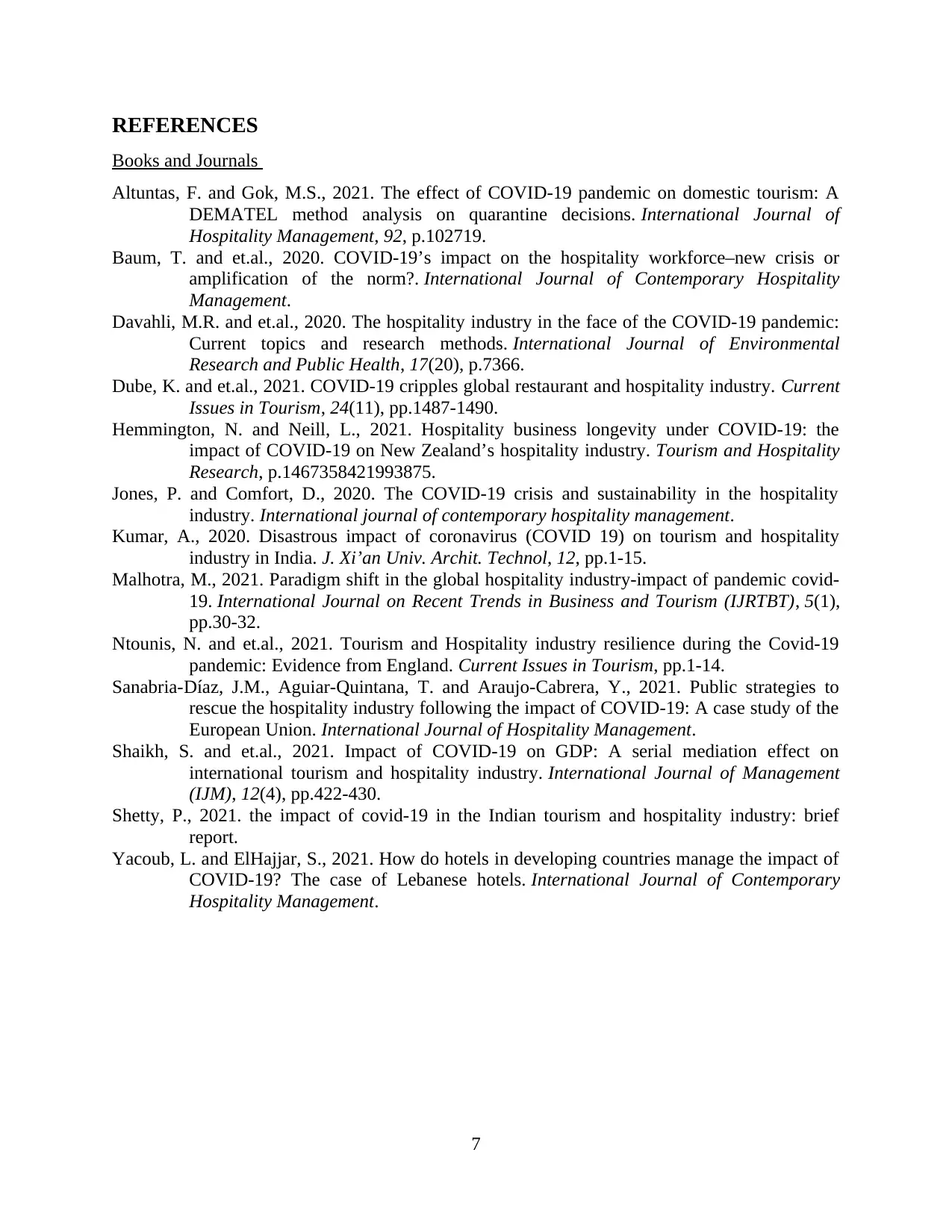
REFERENCES
Books and Journals
Altuntas, F. and Gok, M.S., 2021. The effect of COVID-19 pandemic on domestic tourism: A
DEMATEL method analysis on quarantine decisions. International Journal of
Hospitality Management, 92, p.102719.
Baum, T. and et.al., 2020. COVID-19’s impact on the hospitality workforce–new crisis or
amplification of the norm?. International Journal of Contemporary Hospitality
Management.
Davahli, M.R. and et.al., 2020. The hospitality industry in the face of the COVID-19 pandemic:
Current topics and research methods. International Journal of Environmental
Research and Public Health, 17(20), p.7366.
Dube, K. and et.al., 2021. COVID-19 cripples global restaurant and hospitality industry. Current
Issues in Tourism, 24(11), pp.1487-1490.
Hemmington, N. and Neill, L., 2021. Hospitality business longevity under COVID-19: the
impact of COVID-19 on New Zealand’s hospitality industry. Tourism and Hospitality
Research, p.1467358421993875.
Jones, P. and Comfort, D., 2020. The COVID-19 crisis and sustainability in the hospitality
industry. International journal of contemporary hospitality management.
Kumar, A., 2020. Disastrous impact of coronavirus (COVID 19) on tourism and hospitality
industry in India. J. Xi’an Univ. Archit. Technol, 12, pp.1-15.
Malhotra, M., 2021. Paradigm shift in the global hospitality industry-impact of pandemic covid-
19. International Journal on Recent Trends in Business and Tourism (IJRTBT), 5(1),
pp.30-32.
Ntounis, N. and et.al., 2021. Tourism and Hospitality industry resilience during the Covid-19
pandemic: Evidence from England. Current Issues in Tourism, pp.1-14.
Sanabria-Díaz, J.M., Aguiar-Quintana, T. and Araujo-Cabrera, Y., 2021. Public strategies to
rescue the hospitality industry following the impact of COVID-19: A case study of the
European Union. International Journal of Hospitality Management.
Shaikh, S. and et.al., 2021. Impact of COVID-19 on GDP: A serial mediation effect on
international tourism and hospitality industry. International Journal of Management
(IJM), 12(4), pp.422-430.
Shetty, P., 2021. the impact of covid-19 in the Indian tourism and hospitality industry: brief
report.
Yacoub, L. and ElHajjar, S., 2021. How do hotels in developing countries manage the impact of
COVID-19? The case of Lebanese hotels. International Journal of Contemporary
Hospitality Management.
7
Books and Journals
Altuntas, F. and Gok, M.S., 2021. The effect of COVID-19 pandemic on domestic tourism: A
DEMATEL method analysis on quarantine decisions. International Journal of
Hospitality Management, 92, p.102719.
Baum, T. and et.al., 2020. COVID-19’s impact on the hospitality workforce–new crisis or
amplification of the norm?. International Journal of Contemporary Hospitality
Management.
Davahli, M.R. and et.al., 2020. The hospitality industry in the face of the COVID-19 pandemic:
Current topics and research methods. International Journal of Environmental
Research and Public Health, 17(20), p.7366.
Dube, K. and et.al., 2021. COVID-19 cripples global restaurant and hospitality industry. Current
Issues in Tourism, 24(11), pp.1487-1490.
Hemmington, N. and Neill, L., 2021. Hospitality business longevity under COVID-19: the
impact of COVID-19 on New Zealand’s hospitality industry. Tourism and Hospitality
Research, p.1467358421993875.
Jones, P. and Comfort, D., 2020. The COVID-19 crisis and sustainability in the hospitality
industry. International journal of contemporary hospitality management.
Kumar, A., 2020. Disastrous impact of coronavirus (COVID 19) on tourism and hospitality
industry in India. J. Xi’an Univ. Archit. Technol, 12, pp.1-15.
Malhotra, M., 2021. Paradigm shift in the global hospitality industry-impact of pandemic covid-
19. International Journal on Recent Trends in Business and Tourism (IJRTBT), 5(1),
pp.30-32.
Ntounis, N. and et.al., 2021. Tourism and Hospitality industry resilience during the Covid-19
pandemic: Evidence from England. Current Issues in Tourism, pp.1-14.
Sanabria-Díaz, J.M., Aguiar-Quintana, T. and Araujo-Cabrera, Y., 2021. Public strategies to
rescue the hospitality industry following the impact of COVID-19: A case study of the
European Union. International Journal of Hospitality Management.
Shaikh, S. and et.al., 2021. Impact of COVID-19 on GDP: A serial mediation effect on
international tourism and hospitality industry. International Journal of Management
(IJM), 12(4), pp.422-430.
Shetty, P., 2021. the impact of covid-19 in the Indian tourism and hospitality industry: brief
report.
Yacoub, L. and ElHajjar, S., 2021. How do hotels in developing countries manage the impact of
COVID-19? The case of Lebanese hotels. International Journal of Contemporary
Hospitality Management.
7
1 out of 7
Related Documents
Your All-in-One AI-Powered Toolkit for Academic Success.
+13062052269
info@desklib.com
Available 24*7 on WhatsApp / Email
![[object Object]](/_next/static/media/star-bottom.7253800d.svg)
Unlock your academic potential
Copyright © 2020–2026 A2Z Services. All Rights Reserved. Developed and managed by ZUCOL.


